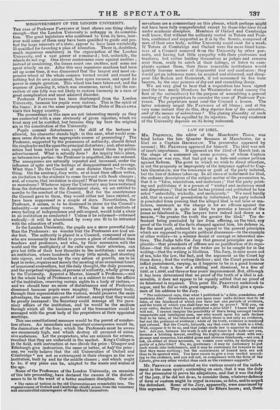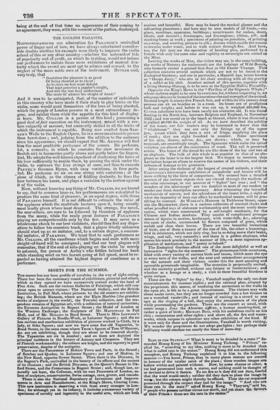LAW OF LIBEL.
MR. PRENTICE, the editor of the Manchester Tinier, was tried before the late Quarter Sessions at Manchester, for a libel on a Captain GRIMSHANV. The prosecutor appeared by. counsel ; Mr. PRENTICE appeared for himself. The libel was not of much importance. It appeared on the 22nd of March last, in the shape of a comment on some persons, of whom Captain GRIIVISHAW was one, that had got up a hole-and-corner petition against Reform. The point to which we wish to direct attention,. is not the propriety or impropriety of the languaee applied to Cap- tain GRIBISHAW, nor the innocence or guilt of the party indicted, but the line of defence taken up. In all cases of indictment for libel, the ordinary description of the subject matter of the prosecution is, that it is " false, scandalous, and malicious ;" that the party print- ing and publishing it is a person of "wicked and malicious mind and disposition ;" that in what he has printed and published he has acted " unlawfully, wickedly, and maliciously." We need hardly add, that in cases of prosecution by indictment, the party indicted is precluded from proving that the alleged libel is not false or ma- licious, inasmuch as the charge is for an offence against the peace, and truth is quite as likely to provoke a breach of the peace as falsehood is. The lawyers have indeed laid down as a maxim, " the greater the truth the greater the libel." The de- fendant being precluded by law from offering, on the trial, any proof of the truth of the facts charged against him, his defence is, for the most part, reduced to an appeal to the general principles which are supposed to regulate political discussion—to the example of other writers—to a solemn denial of corrupt or interested mo- tives. The Judge tells the Jury that general principles are inap- plicable—that precedents of offence are no justification of its repe- tition—that the motives of the writer are to be sought for in the writing—that the writing is libellous. The Jury, in nine cases out of ten, take the law, the fact, and the argument as the Court lay them down ; find the writing libellous ; and the Court proceeds to inflict punishment, varying, as it happens to be in a good humour or a bad, from a fine of a shilling and dismissal, to a fine of 1001. or 1,0001. and three or four years' imprisonment. But, alt hough it has been determined that no proof of the truth of a libel is ad- missible, it does not appear to be equally settled that no proof of its falsehood is required. This point Mr. PRENTICE undertook to argue, and he did so with great ingenuity. We shall give a specie. men of his address to the Jury.
" The indictment says, that what I published is a false, scandalous, and malicious libel.' Gentlemen, can you upon your oaths declare that to be false, of the falsehood of which you have not one particle of evidence, and the truth of which you shall hear me oiler to prove ? Will you, on. your oaths, declare that I have published a false libel ? I know t hat you. will not. I cannot imagine the possibility of there being amongst twelve respectable and intelligent men, one who would upon his oath declare that to be false, of the falsehood of which there is not only no evidence, but not the pretence of evidence ; while of its truth, evidence is tendered and refused. But the Courts, forsooth, say that even the truth is a libel. Well, suppose it to be so, and that judge-made law is superior to statute i law. Are you, because the truth is not at all times to be told—are you, because a hireling lawyer, swelling his highly-charged sheet with sur- plusage and nonsense, has added gross and obvious falsehoods,—are you, I ask, on either of these accounts, to violate your oaths, by declaring me guilty of a false libel ? No, no, gentlemen : it may be customary to put such words into indictments, and it may be customary for lawyers to say that they mean nothing; but the consciences of honest men are not thus to be sported with. You have sworn to give a true verdict accord- ing to the evidence, and you will not, in compliance with the dicta of the Courts, give any other verdict than such as the evidence supports."
Mr. PRENTICE commented on the various counts of the indict- ment in the same spirit; contending on each, that it was the duty of the prosecutor to prove his allegations, and that it was the duty of the jury, if he did not do so, to consider them, whatever defence of form or custom might be urged in excuse, as false, and to acquit the defendant. Some of the Jury, apparently, were convinced by this argument. They were enclosed for fifteen hours ; and, there being at the end of that time no appearance of their coming to an agreement, they were, with the consent of the parties, discharged.



























 Previous page
Previous page